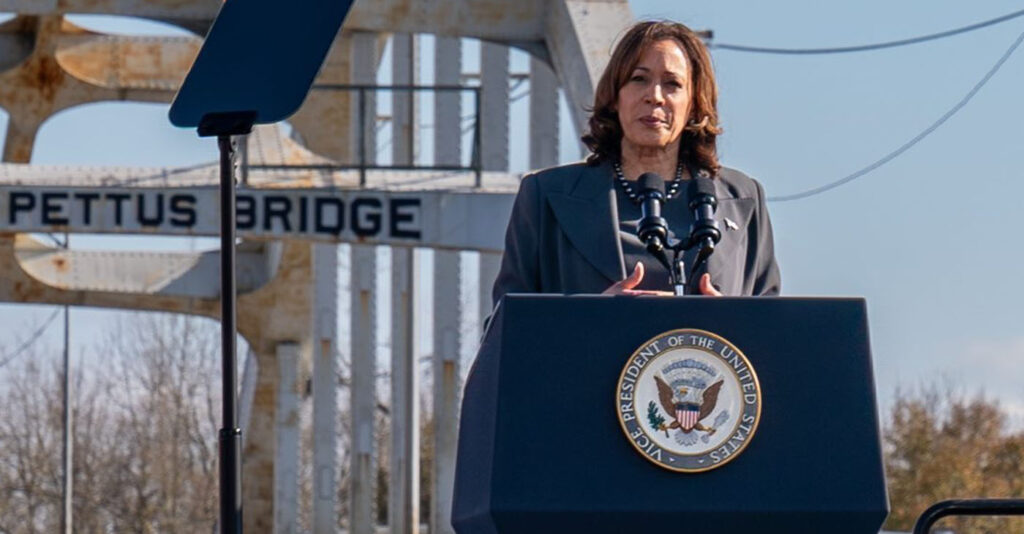By Stacy M. Brown
NNPA Senior National
Correspondent
To help commemorate the 59th anniversary of Bloody Sunday, Vice President Kamala Harris stood alongside activists and community leaders on the iconic Edmund Pettus Bridge in Selma, Alabama, where she used the occasion to mark history and to call for a ceasefire in the Middle East.
“People in Gaza are starving. The conditions are inhumane, and our common humanity compels us to act,” the vice president declared to cheers. “The Israeli government must do more to significantly increase the flow of aid. No excuses.” On the anniversary of Bloody Sunday, Israel pulled out of ceasefire discussions because the nation’s leaders said Hamas would not release the names of living hostages.
“Hamas claims it wants a ceasefire. Well, there is a deal on the table,” Harris asserted. “And as we have said, Hamas needs to agree to that deal. “Let’s get a ceasefire. Let’s reunite the hostages with their families. And let’s provide immediate relief to the people of Gaza.”

She then turned her attention to the brutal attack on peaceful protesters who were calling for voting rights on March 7, 1965, noting it as a memorable turning point in the Civil Rights Movement. “The challenges we currently face are not unlike the challenges faced by those 600 brave souls 59 years ago,” she said.
Fifty-nine years ago, Dr. Martin Luther King Jr. and other civil rights leaders led a nonviolent march from Selma to Montgomery to demand equal voting rights for African Americans. However, as the marchers approached the Edmund Pettus Bridge, Alabama state troopers brandishing billy clubs and tear gas violently disrupted their peaceful procession.
Per the National Archives: “With Hosea Williams of the Southern Christian Leadership Conference (SCLC) leading the demonstration and John Lewis, Chairman of the Student Nonviolent Coordinating Committee (SNCC), at his side, the marchers were stopped as they were leaving Selma, at the end of the Edmund Pettus Bridge, by some 150 Alabama state troopers, sheriff’s deputies, and possemen, who ordered the demonstrators to disperse.
“One minute and five seconds after a two-minute warning was announced, the troops advanced, wielding clubs, bullwhips, and tear gas. John Lewis, who suffered a skull fracture, was one of fifty-eight people treated for injuries at the local hospital. Less than one week later, Lewis recounted the attack on the marchers during a federal hearing at which the demonstrators sought protection for a full-scale march to Montgomery.
The televised brutality shocked the nation and propelled the urgent need for federal intervention. Later that year, President Lyndon B. Johnson signed the Voting Rights Act into law, a significant legislative milestone in the ongoing fight for equal access to the ballot.
The annual Selma Bridge Crossing Jubilee, spanning several days and culminating on Sunday, served as both a remembrance of the sacrifices made on Bloody Sunday and a call to action for contemporary civil rights challenges. Sunday’s anniversary march, a central event in the jubilee, reenacted the steps of those who faced violence in their pursuit of justice and equality.
During a previous visit to Selma, Harris described the Edmund Pettus Bridge as “hallowed ground,” and emphasized the significance of remembering the sacrifices made by those who fought for the fundamental right to vote.
The White House noted that Harris’s speech would honor the civil rights movement’s legacy and address the contemporary challenges in the ongoing quest for justice. Harris said she wanted to encourage Americans to remain steadfast in defending their fundamental freedoms, particularly in the face of current threats to voting rights nationwide.
The Selma Bridge Crossing Jubilee also featured a pre-march public conversation, where National Newspaper Publishers Association President and CEO Dr. Benjamin F. Chavis Jr. and the Rev. Mark Thompson shared insights into the historical struggles of the 1960s.
Chavis, a member of the Wilmington 10 and a key figure in the civil rights movement, underscored the enduring nature of the fight for justice. “On the bridge over here, we were beaten down. That was 59 years ago, and we’re still being beaten down,” he declared. He expressed urgency and added, “We have to do something about it. We’re tired of being beat down.”
Chavis reminded those in attendance that, as the nation grapples with contemporary challenges to voting rights and social justice, the Selma Bridge Crossing Jubilee remains a symbolic and substantive annual event, reminding all Americans of the “historical struggles that paved the way for progress while urging continued vigilance in the face of present-day challenges.”




